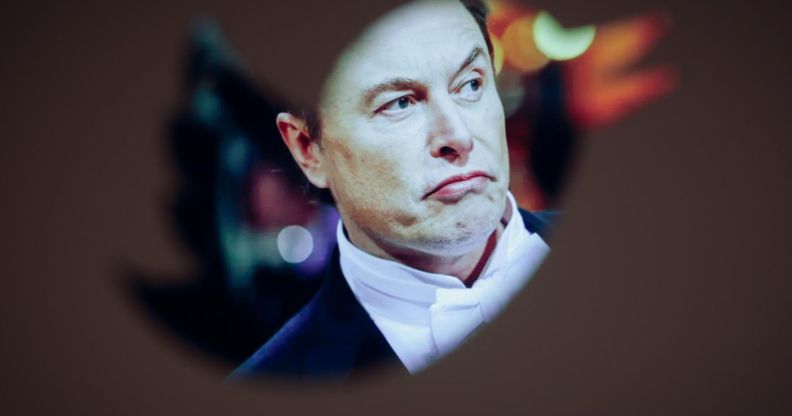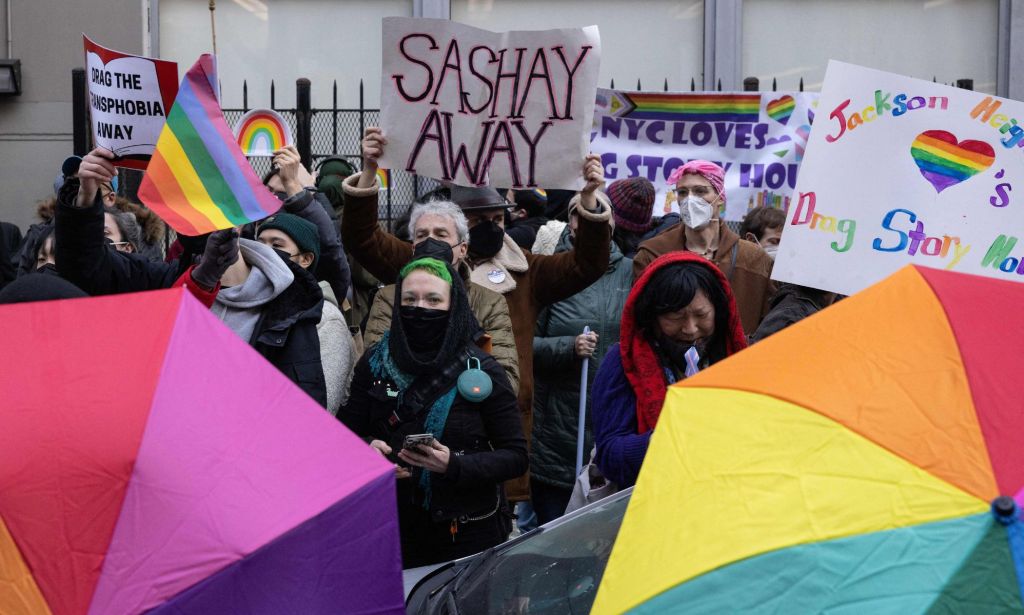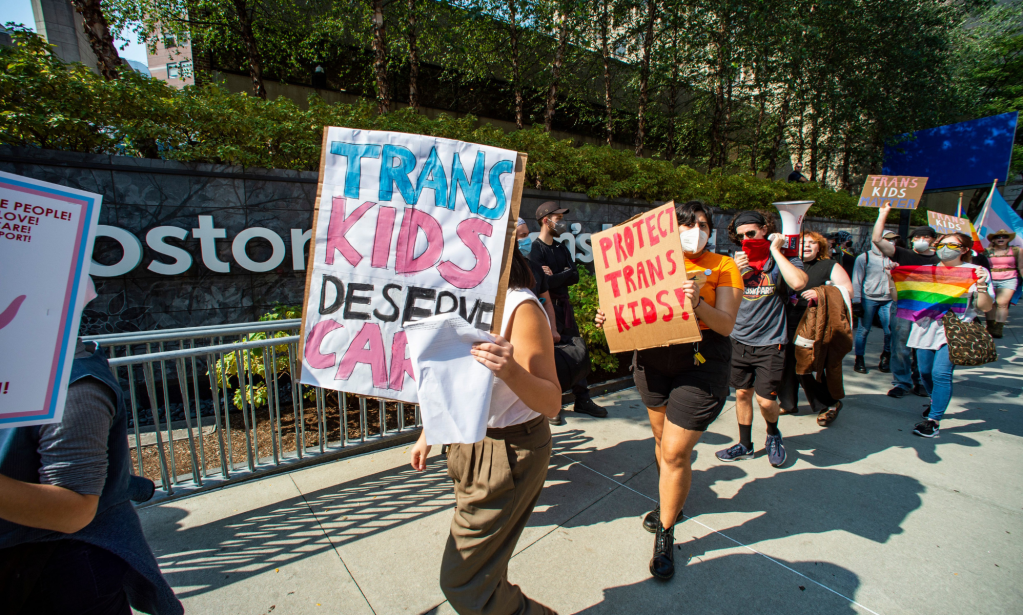Toxic social media is ‘reversing’ real-world progress, experts warn

LGBTQ+ advocates have seen a dramatic increase in hateful rhetoric, including anti-LGBTQ+ slurs, on Twitter since Elon Musk took over the social media platform. (Getty)
Even if Elon Musk steps away from Twitter, the “degradation” of social media poses a growing threat to LGBTQ+ civil rights.
Since buying Twitter in October 2022 and installing himself as CEO, Musk has become notorious for the speech he suppresses and the hateful accounts he amplifies, from suspending journalists for tweeting links to his jet tracker to interacting with notorious anti-LGBTQ+ account Libs of TikTok.
Musk would like to brand himself as a bastion of ‘free speech’, but that speech is often at the expense of marginalised people. He’s used his personal account to boost far-right memes, and has joined the conservative crowd in deriding Democrats and anyone he perceives as part of ‘the Left’ in an escalating crusade against so-called ‘wokeism’.
In December, Musk announced he would resign as Twitter CEO – but only when he identifies a successor. Over a month later, Musk has yet to step down as he presumably hasn’t found “someone foolish enough to take the job”.
Center for Countering Digital Hate chief executive Imrad Ahmed is concerned about the rise in anti-LGBTQ+ rhetoric and attacks towards marginalised groups on the social network.
He explains there have been “great achievements” in gaining civil rights for LGBTQ+ people and other marginalised groups in “our generation”.
However, he warns all this work is “being undone” because of the “threat posed by the degradation of our information ecosystem”.
“The problem with having that information ecosystem and a lens that is distorted to fit the commercial interests of social media platforms is that the progress that we’ve made over 20 years is not just stopping – it’s reversing,” Ahmed says.
“What a miserable thing that in our physical ecosystem, which has been degraded by climate change caused by corporate greed, that the world that we leave for our kids is going to be less livable, less habitable, less ecologically rich because of climate change – [and] the world we leave behind us as a result of information ecosystem degradation is driven by those factors of corporate greed and laziness [and] is a world in which democracy can’t flourish, in which tolerance is reversed.”
Musk shared slides from a company talk he gave on 27 November claiming that “hate speech impressions” had dramatically fallen on the platform since his takeover. He reiterated in another tweet on Friday (2 December) that hate speech continues to “decline, despite mass user growth”.
The claims surprised many, given Musk has executed mass layoffs, chased away other employees and drained the company of resources needed to enforce Twitter’s content moderation policies since the completion of his Twitter takeover in October.
The CCDH released a report looking at the increase in hateful language on the platform in the week beginning 31 October – the first full week under Musk’s ownership – and it was a damning read.
Among its findings, there were at least 21,903 tweets and retweets mentioning the homophobic slur “f****t”, up 39 per cent on the 2022 average. Hatred towards trans people also increased with the slur “t****y” being mentioned in 33,926 tweets and retweets, up 53 per cent on the 2022 average.
The report also found racist, antisemitic and other hateful abuse was rife on the platform.
Research shows that frequency and incidences of anti-LGBTQ+ rhetoric online has volatile consequences offline. There has been a surge in threats to hospitals over trans healthcare, anti-LGBTQ+ legislation and hounding of queer people as a result of online bigotry.
Laurel Powell, deputy director of communications for the Human Rights Campaign’s Foundation programmes, says there are “direct links between the rise in online rhetoric, disinformation and offline consequences”.
“It’s tremendously troubling,” Powell says. “Social media is almost a double-edged sword because so many LGBTQ, particularly trans people, find community online in ways that weren’t open and didn’t exist for our peers 30 or 40 years ago, but it also makes us far more visible and visibility can cut both ways.”
Powell adds it’s “incumbent” on social media companies like Twitter, Meta, TikTok and others to “take their responsibility to provide a safe environment free from harassment seriously”.

Twitter has repeatedly refused to remove anti-trans tweets from influential right-wing pundits – including Marjorie Taylor Greene and Ken Paxton – that violate the website’s rules about hateful conduct because they “may be in the public’s interest”.
This is despite Twitter’s own rules deliberately prohibiting “targeting others with repeated slurs, tropes or other content that intends to dehumanise, degrade or reinforce negative or harmful stereotypes about a protected category”.
“Elon Musk himself has indicated numerous times that he wants to ‘take a look at’ the policy around targeted misgendering and deadnaming, harassment of trans people [on Twitter],” Powell says.
She adds: “We don’t know if that policy is still in force. It’s still on their website, but we don’t know.”
Media Matters’ deputy research director Kayla Gogarty describes such policies as a “lot of empty words and promises” that social networks use to get “good press and good publicity”.
“In reality, they’re not able to provide a lot of these users the safety and security that they need on these platforms,” she says. “It’s become particularly problematic in the sense that we’ve seen a lot of online harm and real-world harm happening to LGBTQ people and those who give LGBTQ people services.”

Gogarty says Media Matters saw Twitter uses “immediately test the waters” after Musk acquired the platform, and there was an “immediate rise in racist rhetoric and of anti-LGBTQ+ accounts purposely putting out tweets with that groomer rhetoric”.
Ahmed says the toxicity online has resulted in people feeling “under threat because the hostility towards their identities is so visible”, and that social media has coded “our brains to think of the world as fundamentally hateful”.
“Our semi-squishy brains can’t differentiate between the fear, rejection and hate that we feel on social media platforms compared to a newspaper, the telly or anywhere else,” Ahmed says. “No one would ever say, ‘That’s just on the telly. It’s not in the real world.’ What’s the difference?”
How did this story make you feel?

